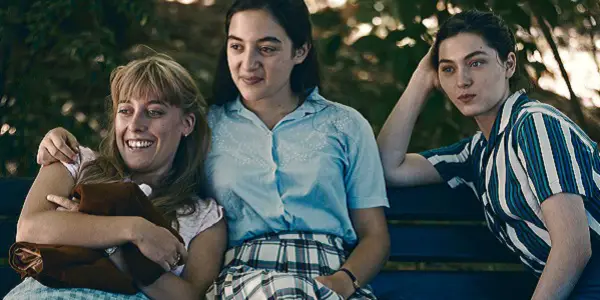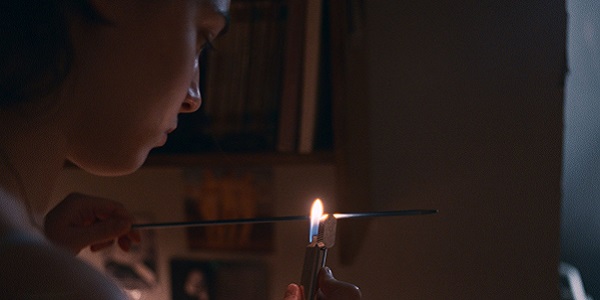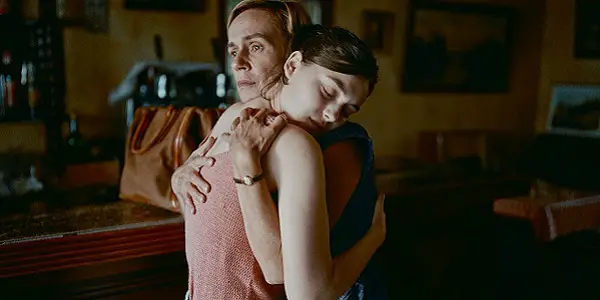HAPPENING: Then, Now, Tomorrow
Lee Jutton has directed short films starring a killer toaster,…
In 1963, 23-year-old French student Annie Ernaux found out she was pregnant. Unmarried and unwilling to sacrifice a promising future to become a mother at that specific moment in time, she sought out an abortion. The problem? Abortion was illegal in France up until 1975.
Nearly forty years later, Ernaux—one of France’s most acclaimed authors—revisited her diary entries and other writings from that time to tell the story of how her desperate quest to end her pregnancy by any means necessary almost killed her. That book, Happening, is the source material for director Audrey Diwan’s sophomore feature film of the same name.
Winner of the Golden Lion at the 78th Venice International Film Festival, Happening is an unflinching portrayal of the horrors that far too many people around the world have gone through—and still go through—in order to exercise control over their own bodies. It opens in the United States just as the Supreme Court contemplates overturning Roe v. Wade, the landmark ruling that legalized abortion in the U.S. in 1973. Yet even if one disregards this unfortunate timeliness, Happening remains an incredibly powerful film that drives home the fact that outlawing abortions will not prevent people from getting them—it just means they will go to more dangerous lengths in order to do so.
Her Body, Her Choice
Anne (the brilliant Anamaria Vartolomei) is a bright young woman studying literature at Cité Universitaire in Angoulême. Her time is divided between studying for her final exams and going out to dance and flirt with boys, accompanied by her close friends Hélène (Luàna Bajrami, who was the low-key MVP of Portrait of a Lady on Fire) and Brigitte (Louise Orry-Diquéro). Other female classmates mock her, believing she’s “easy,” but Anne tries to not let that bother her—she’s smarter than them anyway.

Anne’s working-class parents admire and encourage her as the “gifted” one of the family, the one who will be able to go on to a great university and have a career behind a professor’s desk instead of a cafe counter or factory workbench. However, Anne’s plans for the future are thrown into disarray when she discovers she is three weeks pregnant—the result of a whirlwind liaison with a visiting student from Bordeaux.
Keeping the baby is never a consideration for Anne; when her doctor gives her the news, her immediate response is to demand that he “do something.” Unfortunately, in a country where abortion is illegal, there isn’t much her doctor can do without risking arrest; voluntarily terminating a pregnancy is so taboo that to even speak of it out loud results in anxiety and fear from all in earshot. Nonetheless, Anne is determined to do whatever it takes to find a way out of her predicament. “I’d like a child one day, but not instead of a life,” she declares.
Fight For Your Rights
Title cards interspersed throughout Happening tick by the weeks that pass as Anne struggles in her single-minded quest to secure an abortion, beginning at three weeks and going all the way through to twelve. Along the way, there are plenty of deeply uncomfortable moments in which you may want to look away; one, in particular, involves a sterilized knitting needle and made me cringe in a mix of sympathy and agony. But you can’t look away, and you shouldn’t. Anne’s pain and desperation—the consequences of not being able to control what happens to her own body—need to be seen. They are a flashback to what was, a depiction of what is, and a premonition of what is to come if we continue to restrict and criminalize abortion in the United States.

Anne is not only desperate, but she’s also incredibly alone, unable to even confide in her mother (the legendary Sandrine Bonnaire) or her most trusted professor (Pio Marmaï). When she finally tells her two best friends—girls she’s so close with that they share each other’s gum—they refuse to listen, afraid that just by discussing what Anne wants to do they will all be implicated in a crime. (Personally, I found this incomprehensible; if your friends aren’t willing to risk arrest to help you get an abortion, get new friends.) When she approaches a male classmate who knows “lots of girls,” hoping that he’ll be able to point her in the direction of at least one who has had an abortion, he instead tries to coerce her into sex, arguing that there will be no risk because she’s already pregnant.
This loneliness, verging on claustrophobia, is emphasized by Laurent Tangy’s immersive cinematography, which makes the audience feel as though we too are stuck in Anne’s situation and unable to get out. Anne is often photographed in extreme close-up, her face trapped within the tight, 1.37:1 aspect ratio. Other times, she lurks on the edge of the frame, observing the others around her who remain blissfully oblivious to what she is going through. When Anne finally does manage to find a back-alley abortionist’s office, the procedure is shot in one long take, from her perspective, with the camera lurking behind Anne’s shoulder as her body tenses and quivers in pain.
The scenery and supporting characters in Happening are often depicted as hazy and slightly out-of-focus, keeping the emphasis on Anne and her dilemma while also conveying how much everything else in her life has faded into the background since she discovered she was pregnant. And while the film does take place in the 1960s, it doesn’t have too many obvious period trappings; with the exception of the characters’ reliance on pay phones, one could easily believe these events were happening today. All of this, combined with Evgueni and Sacha Galperine’s poignantly spare score—featuring the sparse but sharp plucking of strings—helps one to fully understand and empathize with Anne’s extreme solitude.

Conveying such trauma and anguish is a lot for a young actress to take on, and yet Vartolomei makes it all appear so authentic that you’ll often feel as though you’re watching a documentary. The character of Anne is standoffish and stubborn, and not always the easiest person to like, but that makes her all the more real. Vartolomei’s striking, stony face often feels like a mask put on to help hide her secret from the world, which means those rare instances that it crumbles and dissolves into anger and tears are all the more effective. It’s a great performance that won her a much-deserved César Award for Most Promising Actress and should elevate her to even greater things in the future.
Conclusion
Happening does not preach to us about why women should be able to get abortions; rather, it epitomizes the power inherent in that old adage “show, don’t tell.” All Diwan does is give us the opportunity to observe and experience everything Anne goes through. And while Anne’s determination to do what is best for her despite the almost insurmountable obstacles standing in her way is admirable, Happening makes it clear that such determination shouldn’t be necessary—for her, or anyone else.
What do you think? What are some other films you have seen that tell abortion stories? Share your thoughts in the comments below.
Happening opens in theaters in the U.S. on May 6, 2022. It opened in the UK on April 22, 2022. You can find more international release dates here.
Watch Happening
Does content like this matter to you?
Become a Member and support film journalism. Unlock access to all of Film Inquiry`s great articles. Join a community of like-minded readers who are passionate about cinema - get access to our private members Network, give back to independent filmmakers, and more.
Lee Jutton has directed short films starring a killer toaster, a killer Christmas tree, and a not-killer leopard. Her writing has appeared in publications such as Film School Rejects, Bitch: A Feminist Response to Pop Culture, Bitch Flicks, TV Fanatic, and Just Press Play. When not watching, making, or writing about films, she can usually be found on Twitter obsessing over soccer, BTS, and her cat.













